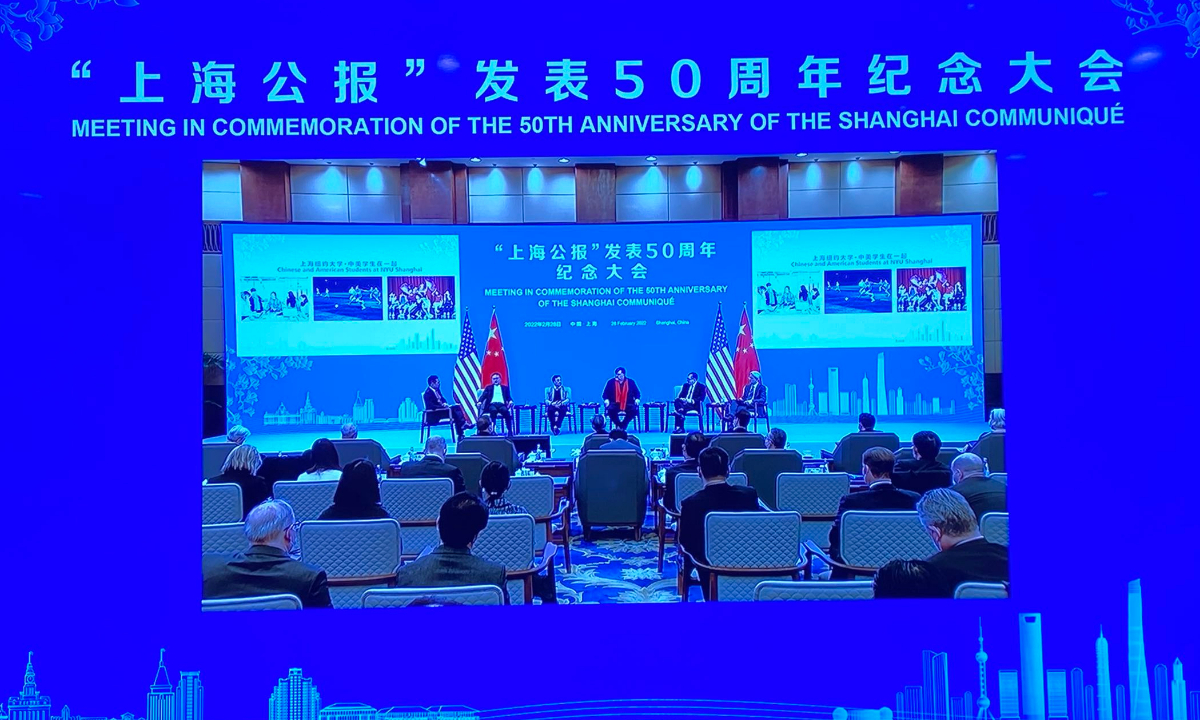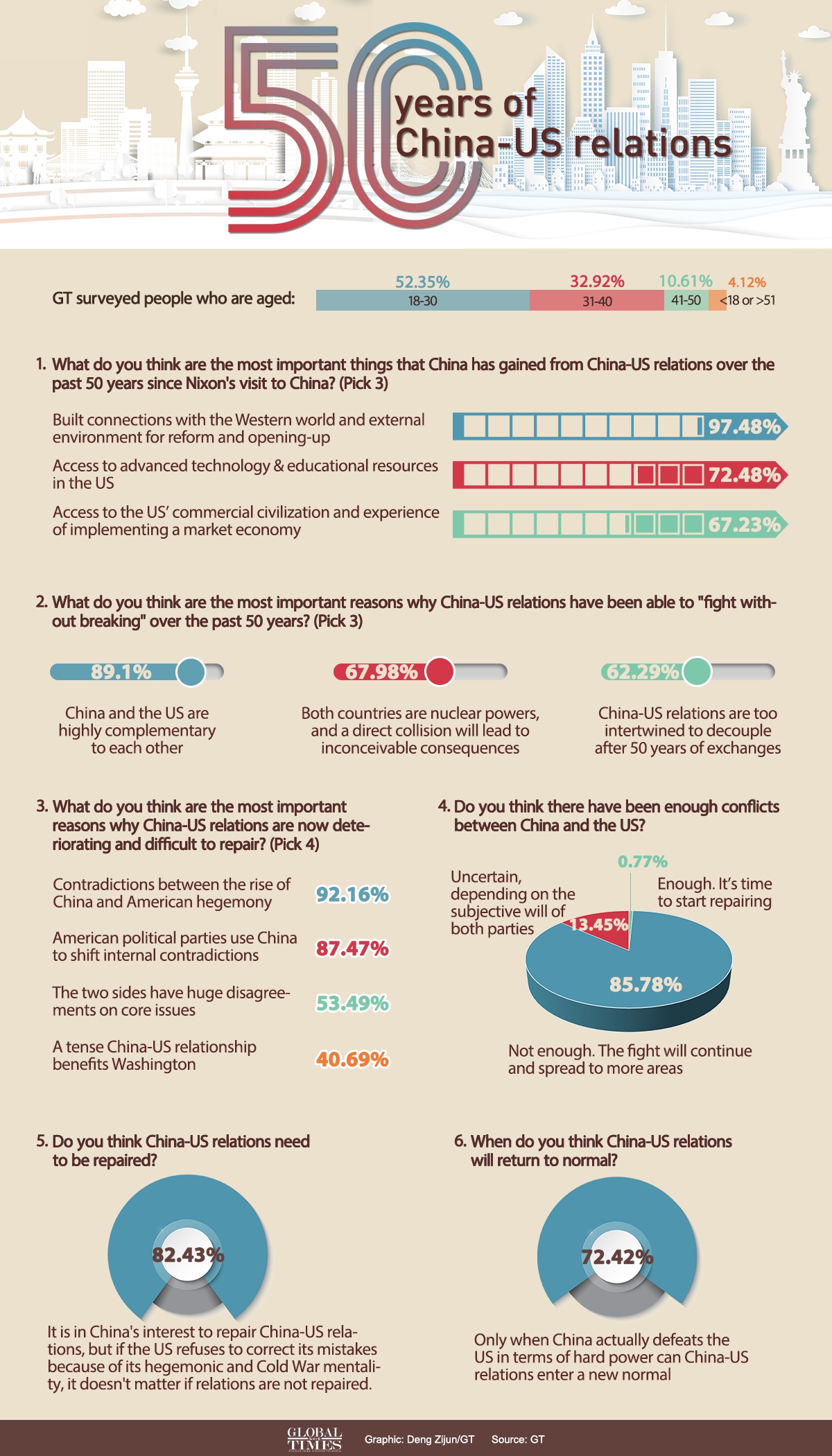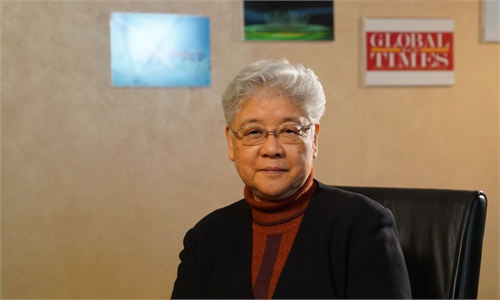China won't abandon principles to repair ties with US: GT survey
FM recalls key moments at event commemorating signing of Shanghai Communiqué

Guests have a discussion at meeting in commemoration of the 50th anniversary of the Shanghai Communiqué in Shanghai on February 28. Photo: GT
Half a century ago, China and the US decided to formally normalize their ties, using wisdom and courage to break ideological barriers and internal and external pressures, and in the past 50 years, both countries have benefited greatly from each other. Today, however, bilateral ties have plunged into a historical low and are still far from recovered, as the US hasn't corrected the mistakes it has made, said experts. A recent survey conducted by the Global Times showed that most Chinese people don't expect the US to correct its mistakes and fix ties with China, and even believe that bilateral ties will keep worsening.
Chinese experts on China-US relations said that after a series of serious frictions in recent years - including the trade war, the Hong Kong turmoil of 2019, US' stigmatization and racist sentiments against China and Chinese amid the COVID-19 pandemic, and provocations and interference in China's Xinjiang and Taiwan related affairs - Chinese people have already become used to tensions with the US, so they have very low expectations about the future ties, as Washington has shown no sign that it will fix its mistakes.
No matter which party is ruling America, China has warned the US numerous times on the Taiwan question, and if one day the worsening China-US ties do totally go out of control, the fuse will be Taiwan question, and the consequences will be much worse than the US can imagine, so the US should stay away from challenging the one-China principle.

50 years of China-US relations Graphic: Deng Zijun/GT
Positive side of tiesThe first document of the China-US three communiqués - the Shanghai Communiqué - was signed 50 years ago amid the first visit made by then US President Richard Nixon. On Monday, China held an event in Shanghai to commemorate the signing of the communiqué.
Chinese State Councilor and Foreign Minister Wang Yi delivered a keynote speech at the event via video links. Guests from Chinese and US political, business and academic circles, including Henry Kissinger, a key figure behind the historic visit and former US Secretary of State, and Jacob Lew, former US Treasury Secretary, attended the event via video link.
Wang said at the event, "The two countries, once at war with each other, have established 50 pairs of sister provinces/states and 233 pairs of sister cities. Before the COVID-19 pandemic,more than 300 flights shuttled between the two countries every week, and over five million trips were made across the Pacific every year."
"From tackling terrorism, financial crises and Ebola, to providing leadership in the signing of the JCPOA and the conclusion of the Paris Agreement on climate change, China and the United States did many great things that benefited the world through their cooperation," Wang remarked.
Under the poisoned atmosphere in the US on China, many political elites in Washington have refused to acknowledge the positive side of China-US relations, specifically exaggerated the negative side, and even said that the US engagement with China started by Nixon was wrong. However, the Chinese government and people all remember and acknowledge that China-US ties are benefiting both countries, as well as the rest of the world.
A recent survey conducted by the Global Times on China-US relations that covered 4,774 participants (52.33 percent of whom were aged 18-30) across China from Thursday to Friday showed that 97.49 percent of the participants believe that the normalization of ties with the US was a key precondition for China's reform and opening-up.
But they also understand that the normalization of China-US ties not only benefited China. While answering the question on what led China and the US to reach out to each other and even go through a "honeymoon" period from 1979 to 1989, most people selected "China and the US both faced threats from Soviet Union" (43.38 percent) and "China is a major power that could completely change the result of the Cold War and that the US must cooperate with" (33.58 percent).
China never begged the US for the normalization of ties, and US politicians should make no mistake that China and the US today still need each other. This interdependency has not fundamentally changed due to the frictions of recent years, and the US cannot handle a relationship with China that is defined only by competition, said experts.
One-China principle
The most important precondition for China and the US to normalize and establish ties is that they were able to reach an agreement on the most significant political foundation based on pragmatic common ground and avoid detailed divergences on specific matters, and that is the spirit of the Shanghai Communiqué, said Wu Xinbo, dean of the Institute of International Studies at Fudan University.
The Chinese foreign minister also stressed the importance of this principle on Monday. He said, "The Taiwan question is the core issue in the Shanghai Communiqué, and the one-China principle is the cornerstone of China-US relations."
In 1971, the US affirmed to China the new principles it would follow with regard to the Taiwan question. They include: the US acknowledging that there is only one China in the world and Taiwan is a part of China; the US not repeating the phrase that the status of Taiwan is being undetermined; the US does not support, and will not support movements for "Taiwan independence". Nixon reaffirmed these principles to Premier Zhou Enlai during his visit to China in 1972. "That was how the Shanghai Communiqué came into being," Wang said.
Unfortunately, after the disintegration of the Soviet Union, the common threat that made the China and the US stand together has gone, once again making the Taiwan question the most sensitive and dangerous problem between China and the US since the 1990s, and prompting Washington to start playing "the Taiwan card" to contain China by encouraging secessionism and selling weapons to the island.
The US should stop draining the one-China principle of its essence, and hollowing it out. It should stop encouraging and supporting "Taiwan independence" moves, stop attempting to use the Taiwan question to contain China, and stop saying or doing things that interfere in China's internal affairs. "Only in doing so can peace and stability across the Taiwan Straits be truly maintained and the larger interests of China-US relations be upheld," Wang said.
Lü Xiang, an expert on US studies and a research fellow at the Chinese Academy of Social Sciences, told the Global Times that in the past 50 years, China and the US have seen "many inter-locking factors" that make it very difficult to break off bilateral ties, but "if the US makes a mistake on the Taiwan question, then China-US ties will immediately get worse."
How to fix ties?
The Taiwan question is just one factor leading to worsening China-US ties, but there are many other problems including illegal and unfair tariffs, interference in China's Hong Kong and Xinjiang related affairs, as well as the forming of alliances in the Asia-Pacific region to contain and threaten China, all of which makes it difficult to ease China-US tensions.
The survey showed that 92.19 percent of the participants believe that the root problem is that "the US would never accept a great power emerging in the Eurasian continent, and China's development and national rejuvenation is a structural contradiction to the US desire to maintain its hegemony."
Furthermore, 87.41 also believe "unfixable internal problems in the US mean the two parties in America need to form an external threat. Hyping negative sentiment against Chinese could help them ease internal pressure, and make it easier to shift the blame."
Meanwhile, 82.43 percent consider that "fixing China-US ties is good for China, but if the US refuses to correct its mistakes due to its hegemonic and cold war mentalities, it's fine to leave China-US ties unfixed" and "the precondition for fixing China-US ties is that the US must correct the mistakes it made. China should not go against its principles and bottom lines to fix ties."
On the same day that the event commemorating the signing of the Shanghai Communiqué was held in Shanghai, China's State Council Information Office on Monday issued a Report on Human Rights Violations in the United States in 2021.
The report said the human rights situation in the United States, which has a notorious record, worsened in 2021. Its political manipulation led to a sharp surge in COVID-19 deaths, while the mortality rate in the country hit a new record. Fake democracy has trampled on people's political rights and violent law enforcement has made life harder for migrants and refugees in the United States, the report said.
This proves that China is dealing with the US with confidence and clear bottom lines. Making efforts to fix ties with the US, developing relations with American people, opposing the mistakes made by the US and retaliating against US hegemonic and bullying acts can all happen at the same time, said analysts.
The survey also showed that 72.37 percent of the participants believe that "the problems in the US economy and other domestic problems can't be entirely fixed. The decline of US hegemony is highly possible, but the US won't accept the reality, and it might attempt to use war against others to stop its decline and this could cause a direct conflict between China and the US. China-US ties could only enter a new normal after China's comprehensive national strength completely surpasses the US'."
And 85.78 percent of participants believe that there will be more struggles between China and the US in the future, and that ties are far from recovered.
Li Haidong, a professor from the Institute of International Relations of China Foreign Affairs University, told the Global Times that the result of the survey is also an indication of when China-US ties can be fixed.
"It's unrealistic for Chinese to expect the US to carry out introspection and effectively correct its mistakes on its China policy. The US only respects power that it cannot defeat and is unable to contain, so when China becomes powerful, prosperous and modernized enough, and does even better than the US in more fields, ties with the US can be effectively fixed and become truly sustainable," Li said.



